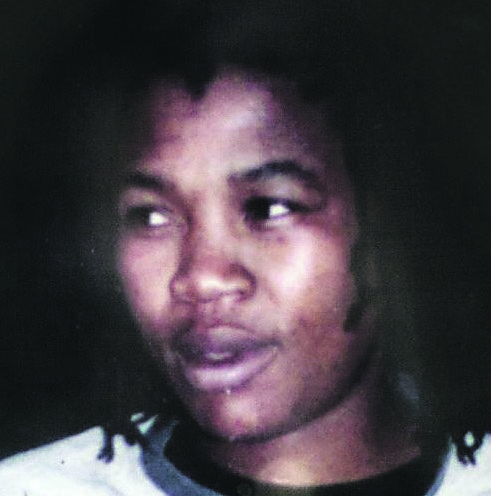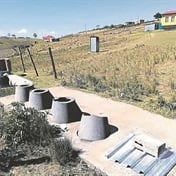
Eight years ago, an openly lesbian Banyana Banyana star, Eudy Simelane, was raped and murdered. How much has changed since then, if anything? Zinhle Mapumulo looks at her legacy, talks to LGBTIQ activists, and visits her family and parish priest in
“We are reminded every day of Eudy, but in April it’s worse,” says Mally Simelane, who is sitting in her living room in KwaThema on the East Rand in Gauteng.
It’s nearly eight years since her daughter Eudy was raped and murdered, but for Mally, April 28 2008 still feels like yesterday.
And that’s not surprising. Mally works tirelessly in her community to promote tolerance of lesbian, gay, bisexual, transgender, intersex and questioning (LGBTIQ) citizens. Every time she does so, she talks about Eudy, and every time she does that, the memories return.
She turns and looks at her husband, Khotso, who is sitting next to her, as if to draw strength from him.
“Almost eight years have passed, but to this day, I still hear her footsteps around the yard as she prepares to go for an early-morning run. Every time I hear the sound of the gate opening, I expect her to walk into
the main house and say, ‘ma-O’lady u-right [Are you okay, mother]?’ But that can never happen because she is gone.”
...
Some people within the LGBTIQ community feel Eudy Simelane receives too much media attention – that we must remember every name of every lesbian murdered and raped in South Africa, not just some. Yet, asking around, very few people have even heard of her. It’s one of the conundrums facing those fighting hate and crimes against women’s bodies in South Africa.
So, for those who don’t know, Eudy was a former midfielder who was talented enough to play internationally with Banyana for a few years. She was a football coach and was training to be a referee. Mally says Eudy came out to her as gay when she was just 12.
The New York Times interviewed Eudy’s close friend Pretty Makhalya in an obituary: “There were three of us: Eudy, me and Zodwa ... Whatever we did was boyish. We were different, you could tell. We were athletes. We played with the boys, but we had feelings for the girls.”
By high school, they better understood their sexuality, she said. They wore pants and T-shirts, jockey shorts instead of panties ... KwaThema was unusual among townships. Lesbians were quite open. Most boys their age were comfortable around them.
“But there were also guys who’d say: ‘C’mon, we’ll teach you how to be a girl,’” Pretty said.
Eudy was actively involved in championing the rights of LGBTIQ members of her community. She worked relentlessly to uplift the community on every level.
She would bar-hop, frequenting all sorts of taverns – not just lesbian-friendly ones. It was when she was returning from a tavern one night that she was accosted by a group of men. Her half-naked, 31-year-old body was found in a creek in a field near a hostel the next day.
She had been gang-raped and stabbed 28 times. A broken bottle was forcibly inserted into her vagina. Two men from KwaThema were eventually convicted. Themba Mvubu was sentenced to 35 years in prison and Thato Mpiti was sentenced to 32.
...
With great difficulty, Mally recalls the day that a neighbour asked her to go to the police station.
“She knows I don’t like police stations, so she made up some story about her son being in trouble. We got to the police station and we were met by the superintendent, who said he had bad news for me.”
When the police chief broke the news that Eudy had been murdered, Mally refused to believe it, saying: “My Eudy is at home sleeping.”
After much arguing, she accepted the truth and followed the police to the crime scene.
“We could not even get close to where Eudy’s body was lying because of the number of people who had gathered there. My son had to navigate through the crowd and came back carrying Eudy’s bloodied clothes. I fainted.
“I did not see what my child looked like after they murdered her and somehow I thank God for that because I would still be holding on to that gruesome picture. Although I still see and hear Eudy, the picture in my mind is that of her smiling, and I cherish that,” Mally says.
...
Eudy was loved in KwaThema. After all, she played for Springs Home Sweepers and Banyana Banyana. Her community celebrated her for putting the township on the map. Most people accepted her lifestyle.
It was easy, says her parish priest, Reverend Phidian Matsepe, to bury her with dignity. Often, clergymen refuse to bury LGBTIQ members of the community because of their religious beliefs.
“Apart from knowing Eudy as a child, I had a duty, as a man of God, to lay her to rest,” he says. “I can never understand why Christians treat homosexuality as the worst sin.
“In church, we welcome adulterers, murderers and even thieves, yet we discriminate against people of a different sexual orientation ... Jesus himself dined with sinners. Who are we then to judge and reject men and women who were created by God?”
...
Since Eudy’s death, Mally and Matsepe have become LGBTIQ rights activists. Whenever Mally is invited to talk to parents about accepting the sexual orientation of their child, Matsepe also tags along if he has time.
Mally explains: “I owe it to Eudy to speak about the rights of gays and lesbians living in our communities ... My daughter died because of who she was. Many had accepted her in our community, but there were those who felt that she was doing something contrary to cultural and religious beliefs, and decided to end her life in the worst possible manner.
“I can never get Eudy back, but I can save another gay or lesbian person’s life by making people understand that being lesbian or gay does not make you less of a human being.”
...
This individual campaigning is part of the change that has happened in the eight years since Eudy’s death – albeit change at a snail’s pace.
Phindi Malaza, programmes manager at the nongovernmental organisation Forum for the Empowerment of Women, has been involved in work on the ground in KwaThema.
“There have been some small successes in terms of attitude change. Mostly, it is with parents,” Malaza says.
“Eudy’s mother is a member of the church and is an elder, so people listen ... We host dialogues about hate crimes and try to work with schools ... What you will find is that individuals will change their attitudes, and that influences others.”
But Malaza stresses that much more work needs to be done so that municipal councillors, traditional leaders and school teachers come on board.
Mpumi Mathabela, campaign coordinator at the One in Nine Campaign, agrees: “Even with changing attitudes, there is no decrease in hate crimes and gender-based violence in South Africa.
“We need to understand the intersectional issues affecting women in townships. Poverty and unemployment, and the way women are viewed by men, are all related ... We are seeing individual mentality change, but not structural change.”
Steve Letsike, director of Access Chapter 2, was one of the first people on the scene of Eudy’s murder, worked on the police and court case, and will be one of the speakers at the Eudy Simelane Lecture.
“The change is very slow,” says Letsike. “LGBTIQ people still feel unsafe in their homes. We have lost so many lives.”
Apart from working with church groups and the LGBTIQ community, Letsike is lobbying government, notably as co-chair of the national task team to combat violence on the basis of sexual orientation and gender identity. Working within the justice department, the team wants to put hate crimes like the murder of Eudy on the national agenda.
“We want to impart knowledge to service providers like the police, justice cluster and health services ... We have set up provincial task teams so slowly, slowly we are getting somewhere.”
...
For Mally, her message is clear: “Let us love and accept our children for who they are because they are a blessing from God. Homosexuality is not new; it’s just that it is more in the open now because we live in a democratic country that allows people to be who they want to be.”
It doesn’t surprise me that her daughter had such strength of character; it’s clear where it came
from.
. More on Eudy Simelane was shared at the inaugural Eudy Simelane Lecture, organised by the Ujamaa Centre, on April 7 at the University of KwaZulu-Natal, Pietermaritzburg
. This feature was made possible through a partnership with the Other Foundation. For more information, visit theotherfoundation.org




 Publications
Publications
 Partners
Partners








